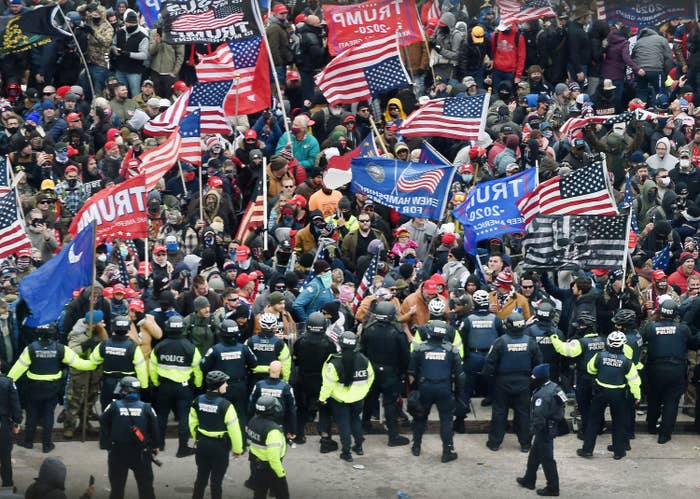
WASHINGTON — Blasting the Republican Party’s reference to the Jan. 6 insurrection and events surrounding it as “legitimate political discourse,” a federal judge questioned whether the Justice Department bore some blame for the “confusion” by letting people charged with storming the US Capitol plead guilty to petty offenses.
US District Chief Judge Beryl Howell has been critical of DOJ's handling of the Jan. 6 prosecution effort in the past. At a sentencing hearing Thursday, she pressed government lawyers to explain the department’s decision to offer plea deals in many cases that featured one of the least serious crimes: parading, demonstrating, or picketing in the US Capitol, a misdemeanor that carries up to six months in jail.
Howell stressed that the attack on the Capitol was not “legitimate political discourse,” saying that it “bears repeating” since a “major political party” believed it. It was a reference to the Republican National Committee’s recent censure of two Republican members of Congress; the RNC resolution accused the lawmakers of “participating in a Democrat-led persecution of ordinary citizens engaged in legitimate political discourse.” RNC Chair Ronna McDaniel later said the line wasn’t a reference to the violence at the Capitol, but as the New York Times noted, the text didn’t feature that nuance.
Howell asked if the government accepted “some responsibility” for “helping to foster some confusion about whether what occurred on Jan. 6 was a protest or legitimate political discourse” by letting defendants plead to the parading charge. The two DOJ lawyers present replied that they couldn’t speak to specific high-level policy decisions, but agreed with the judge that Jan. 6 was not “legitimate political discourse.” They explained that the government’s position was that the breach of the Capitol was criminal and that much of what happened was an act of domestic terrorism.
Howell isn’t the first judge to call out the RNC’s “legitimate political discourse” line. Last week, US District Judge Amy Berman Jackson referenced it during a sentencing hearing for Mark Leffingwell, who pleaded guilty to punching police officers at the Capitol.
“It is not legitimate political discourse and it is not justified to descend on the nation's Capitol at the direction of a disappointed candidate and disrupt the electoral process,” Jackson said, according to a report from ABC News. She sentenced Leffingwell to six months behind bars and two years of supervised release.
Howell went even further, asking DOJ lawyers to address the RNC’s language and suggesting that the government’s management of the investigation contributed to false narratives that persisted in some conservative circles and GOP efforts to downplay the seriousness of the attack.
Prosecutors focused early waves of plea offers on defendants charged solely with misdemeanor crimes. Grace Albinson, an attorney in the DOJ’s Tax Division detailed to handle Jan. 6 cases, initially responded to Howell’s criticism by telling the judge that she didn’t believe that Jan. 6 was a “protest” or “legitimate political discourse.”
Howell told Albinson that she’d been “curious” why the Justice Department allowed defendants to plead to the parading offense when there were other charges that would apply; it suggested that’s all the rioters were doing, the judge said. Howell said she wanted to give the government a chance to explain that decision.
Albinson replied that the judge’s question “sort of gets to the policy decisions of management, who are clearly not myself. So I understand your frustration and I understand your argument and your point, but I don’t feel like I am the person to address it.” She apologized.
Howell didn’t continue to press Albinson. She turned to the second DOJ lawyer present, James Pearce. Pearce, an appellate lawyer in the Criminal Division, has been appearing in Jan. 6 cases to defend the government’s sentencing recommendations. Pearce echoed Albinson’s deference to DOJ policy decisions but also attempted to address the judge’s concern, saying that it wasn’t the government’s role to engage in political discussions about the “political significance” of Jan. 6.
Pearce said the government was focused on “ensuring criminal responsibility” and that the way they’d proceeded with Jan. 6 cases wasn’t different from other investigations; they charged the crimes they believed they could prove beyond a reasonable doubt, he said. Howell pushed back, telling Pearce that what “strikes me” is that the government historically used the parading offense as a kind of “ticket” for a person who stood up during a hearing and yelled. She said she was “surprised” to see it in connection with Jan. 6.
Howell then asked Pearce if he was saying that the government did not “acknowledge any responsibility” for the fact that there might be “confusion” about Jan. 6 at least in part because defendants were pleading guilty to parading.
“That was certainly not our intention,” Pearce replied. He said it was “possible” prosecution choices had caused confusion, but also possible that wasn’t the case. Like Albinson, he said that the government didn’t believe that Jan. 6 was a “protest” or “legitimate political discourse,” and that it was a “criminal event” and “in many respects” an act of domestic terrorism.
Howell then moved on, although she raised the concern again during another sentencing hearing later in the morning.
As for the defendant before her at the time, Howell sentenced Brian Stenz of Pennsylvania to three years of probation, explaining that she thought it was important to have a “lengthy” period of court supervision that would cover the next two election cycles. Stenz had previous criminal convictions, and Howell said that record plus the fact that he made his way into Sen. Jeff Merkley’s office during the Capitol attack set him apart from other misdemeanor defendants. She ordered him to spend 14 days in jail and two months in home detention as conditions of his probation and imposed a $2,500 fine in addition to the $500 in restitution he agreed to pay as part of his plea deal.
